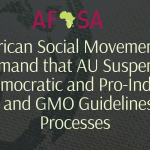In June 2021 AFSA wrote to major institutional donors including the Rockefeller Foundation, Bill & Melinda Gates Foundation, and the governments of USA, UK, Norway, Germany, Canada – calling on them to provide evidence of AGRA’s success and to shift their political and financial support to sustainable, resilient and culturally appropriate agroecological approaches.
Very few responses were received, and none provided any hard evidence that the billion dollar AGRA spending spree had achieved any of its stated aims to double the agricultural yields and incomes of 30 million small-scale food producer households by 2020, thus halving hunger in the 11 focus countries.
Here is the text of the letter.
INQUIRY INTO FUNDING THE ALLIANCE FOR A GREEN REVOLUTION IN AFRICA (AGRA)
Dear (name of CEO)
We are writing as an African alliance of civil society actors. Our member networks represent millions of African citizens in 50 countries. We wish to bring to your attention our concerns about your continued support for the Alliance for a Green Revolution in Africa (AGRA).
We ask you as a funder of AGRA to urgently reconsider your commitment to AGRA and the Green Revolution agenda and shift the focus of your support to sustainable approaches that can really make a difference. We also request that you kindly provide evidence of AGRA’s success, both to demonstrate aid effectiveness and to justify your investment of public funds.
AGRA was founded in 2006 with a productivist, market-based approach to agricultural development centred on expanded use of commercial seeds and chemical fertilizers. AGRA’s main promises were to double the agricultural yields and incomes of 30 million small-scale food producer households by 2020, thus halving hunger in the focus countries.
Several of AFSA’s member organizations contributed to a 2020 study into AGRA’s performance, activities, and impact. Four AFSA member organizations researched four AGRA focus countries – Zambia, Tanzania, Kenya and Mali – and submitted their findings as national case studies, providing on-the-ground information and context which were incorporated into the overall study report.
The report “False Promises – The Alliance for a Green Revolution in Africa (AGRA)”revealed that yield increases for key staple crops in the 12 years AGRA operated were low, little higher than in the period before AGRA. Instead of halving hunger, the situation in the 13 focus countries has worsened since AGRA was launched, with the number of people going hungry increasing by 30 per cent during the AGRA years – before the COVID pandemic began. The study also showed that AGRA had harmed many small-scale food producers in Zambia and Tanzania who could not repay the loans for fertilizer and hybrid seeds after the first harvest. AGRA’s enforced shift from nutritious and hardy small grains like millets to mono-crop commodity maize farming was bad for soil, diets, and agrobiodiversity.
Despite repeated requests from three AFSA member organizations, AGRA failed to provide evidence of impacts[1]and declined to share outcomes surveys and the mid-term evaluation of its 2017-2021 strategy. Some documents were eventually secured through Freedom of Information Act requests, but remarkably they provided no evidence that AGRA is making progress in improving yields, incomes and food security for African farmers. In fact, the documents deepen our concerns about accountability because they make no reference whatsoever to AGRA’s first ten years of activity. Thus far, the Bill & Melinda Gates Foundation has declined to publish or provide its 2016 evaluation of AGRA, which might provide some of that evidence. Stonewalled by AGRA’s lack of accountability and transparency, we turn to you, AGRA’s funders, for answers.
AGRA celebrated its work to change African government policy as a success, reforming seed policies and biosafety regulations to increase the access of commercial seed providers to African markets, including GMOs. While questioning whether influencing African policy is a legitimate activity for a USA registered non-profit organization, we believe that such seed policy change is harmful. It often undermines crop and diet diversity while increasing farmers’ dependence on expensive fossil fuel based external inputs, and weakens citizens’ protection against harmful technologies.
The AGRA approach has failed on its own terms: to double the agricultural yields and incomes of 30 million households and halve hunger by 2020. AGRA now needs donors to replenish its coffers for what has proven to be an ineffective and long outdated approach. The UN HLPE 2019 report on Food Security and Nutrition documents the critical importance of agroecology. Here in Africa, ECOWAS, with the help of the FAO, has launched a 10 year program to scale out agroecology. Evidence is mounting for the role that agroecology can play in responding to Africa’s food, land degradation and climate crises. The need for spreading and scaling agroecology is urgent.However, two[2]major collaborative studies[3]highlight how the imbalance of funding flows to African agricultural research and development, with minimal support to agroecology, is holding up real transformation.
In line with the False Promises report, we specifically recommend that donors:
- increase their funding to African agriculture to help meet continental funding targets.
- provide no further political and financial support for AGRA and its failed Green Revolution approach.
- switch their funding from AGRA to programmes that help small-scale food producers, particularly women and youth, to develop climate-resilient ecologically sustainable farming practices such as agroecology.
We humbly repeat our request that you provide substantive evidence of the efficacy of your investment in AGRA, referring particularly to AGRA’s top-level goals on productivity, hunger and poverty reduction. Failing that, we request that you urgently reconsider your commitment to AGRA and its unaccountable Green Revolution programme, and shift your political and financial support to sustainable, resilient and culturally appropriate agroecological approaches.
Yours sincerely
Million Belay (PhD)
General Coordinator, Alliance for Food Sovereignty in Africa
AFSA brings together small-scale farmers, pastoralists, fishers, indigenous peoples, farmers’ networks, faith-based groups, consumer associations, youth associations, civil societies and activists from across the African continent to create a united and stronger voice for food sovereignty.
[1]https://usrtk.org/wp-content/uploads/2020/10/Correspondence-BIBA-and-AGRA-accountability.pdf
[2]https://www.cidse.org/wp-content/uploads/2021/04/EN-Making-money-move-for-agroecology.pdf
[3]https://www.biovision.ch/en/projects/international/moneyflows-hans-herren/


































[…] international call to cease AGRA funding comes after AFSA wrote to AGRA donors in June to request evidence of the program’s success. AFSA received few replies and no […]
[…] and indigenous peoples across Africa. The international call to cease AGRA funding comes after AFSA wrote to AGRA donors in June to request evidence of the program’s success. AFSA received few replies and no […]
[…] See African groups’ letter to AGRA donors […]
[…] and indigenous peoples across Africa. The international call to cease AGRA funding comes after AFSA wrote to AGRA donors in June to request evidence of the program’s success. AFSA received few replies and no […]
[…] AFSA letter to donors of the Alliance for a Green Revolution in Africa, June 6, 2021 […]
[…] Alliance in June wrote to AGRA’s donors asking them to provide evidence to refute research showing that the 15-year-old industrial […]
[…] governments, throughout AGRA’s annual Inexperienced Revolution Discussion board. In June, AFSA sent a letter to AGRA donors asking for proof that this system is benefiting African farmers. AFSA acquired few […]
[…] German, Dutch and Canadian governments, during AGRA’s annual Green Revolution Forum. In June, AFSA sent a letter to AGRA donors asking for evidence that the program is benefiting African farmers. AFSA received […]
[…] AFSA wrote to all of AGRA’s donors in June asking them to provide research supporting the benefits of AGRA. The African groups said they received few responses, and no credible evidence of AGRA’s benefits to farmers or the general public. African faith groups also reached out to the Gates Foundation in June, with a letter signed by 500 faith leaders asking the foundation to stop funding industrial monoculture farming. That model, they said, is “deepening the humanitarian crisis in Africa.” […]
[…] AFSA wrote to all of AGRA’s donors in June asking them to provide research supporting the benefits of AGRA. The African groups said they received few responses, and no credible evidence of AGRA’s benefits to farmers or the general public. African faith groups also reached out to the Gates Foundation in June, with a letter signed by 500 faith leaders asking the foundation to stop funding industrial monoculture farming. That model, they said, is “deepening the humanitarian crisis in Africa.” […]
[…] wrote to all of AGRA’s donors in June asking them to provide research supporting the benefits of AGRA. The African groups said they […]
[…] wrote to all of AGRA’s donors in June asking them to provide research supporting the benefits of AGRA. The African groups said they […]
[…] wrote to all of AGRA’s donors in June asking them to provide research supporting the benefits of AGRA. The African groups said they […]
[…] wrote to all of AGRA’s donors in June asking them to provide research supporting the benefits of AGRA. The African groups said they […]
[…] wrote to all of AGRA’s donors in June asking them to provide research supporting the benefits of AGRA. The African groups said they […]
[…] AFSA wrote to all of AGRA’s donors in June asking them to provide research supporting the benefits of AGRA. The African groups said they received few responses, and no credible evidence of AGRA’s benefits to farmers or the general public. African faith groups also reached out to the Gates Foundation in June, with a letter signed by 500 faith leaders asking the foundation to stop funding industrial monoculture farming. That model, they said, is “deepening the humanitarian crisis in Africa.” […]
[…] failings clear. We have continually sought to open a dialogue with AGRA supporters, including an open letter to donors in June 2021 that received scant response. Following their silence, AFSA publicly […]
[…] clear. We have continually sought to open a dialogue with AGRA supporters, including an open letter to donors in June 2021 that received scant response. Following their silence, AFSA […]
[…] German, Dutch and Canadian governments, during AGRA’s annual Green Revolution Forum. In June, AFSA sent a letter to AGRA donors asking for evidence that the program is benefiting African farmers. AFSA received […]
[…] AFSA wrote to all of AGRA’s donors in June asking them to provide research supporting the benefits of AGRA. The African groups said they received few responses, and no credible evidence of AGRA’s benefits to farmers or the general public. African faith groups also reached out to the Gates Foundation in June, with a letter signed by 500 faith leaders asking the foundation to stop funding industrial monoculture farming. That model, they said, is “deepening the humanitarian crisis in Africa.” […]
[…] German, Dutch and Canadian governments, during AGRA’s annual Green Revolution Forum. In June, AFSA sent a letter to AGRA donors asking for evidence that the program is benefiting African farmers. AFSA received […]
[…] June 2021, AFSA (The Alliance for Food Sovereignty in Africa) wrote to AGRA’s major institutional donors calling for them to shift their support away from big agribusiness and towards sustainable, […]
[…] June 2021, AFSA (The Alliance for Food Sovereignty in Africa) wrote to AGRA’s major institutional donors calling for them to shift their support away from big agribusiness and towards sustainable, […]
[…] June 2021, AFSA (The Alliance for Food Sovereignty in Africa) wrote to AGRA’s major institutional donors calling for them to shift their support away from big agribusiness and towards sustainable, […]
[…] June 2021, AFSA (The Alliance for Food Sovereignty in Africa) wrote to AGRA’s major institutional donors calling for them to shift their support away from big agribusiness and towards sustainable, […]
[…] Juni 2021 wandte sich die AFSA (Allianz für Ernährungssouveränität in Afrika) in einem Schreiben an die wichtigsten institutionellen Geber von AGRA und forderte sie auf, ihre Unterstützung weg […]
[…] evaluation “largely confirms AFSA’s concerns about AGRA.” The alliance of African groups wrote to the Gates Foundation and other AGRA donors last June asking them to stop funding AGRA and shift their political and […]
[…] evaluation “largely confirms AFSA’s concerns about AGRA.” The alliance of African groups wrote to the Gates Foundation and other AGRA donors last June asking them to stop funding AGRA and shift their political and […]
[…] AFSA letter to donors of the Alliance for a Green Revolution in Africa(6.6.21) […]
[…] Alliance in June wrote to AGRA’s donors asking them to provide evidence to refute research showing that the 15-year-old industrial […]